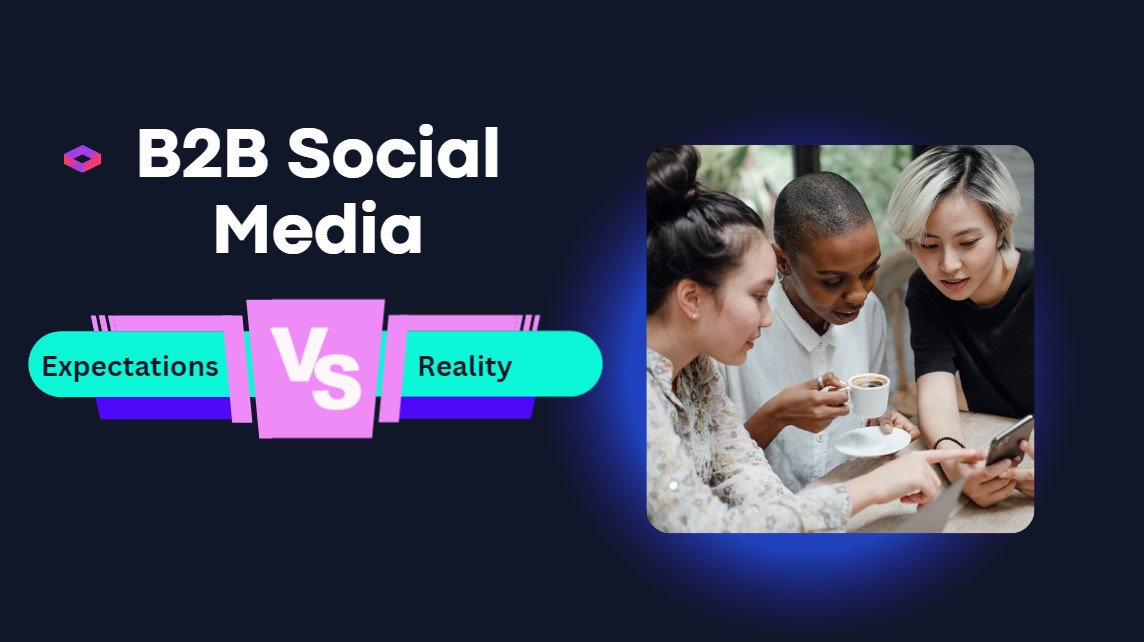There can often be a disconnect between the expectations and reality of social media for B2B companies. In this blog post, we will explore some common expectations versus reality when it comes to social media for B2B businesses.
Expectation: Social media will immediately generate leads and drive sales.
Reality: Social media is a long-term investment.
One common misconception about social media for B2B companies is that it will result in immediate lead generation and sales. However, the reality is that social media is a long-term investment that requires consistent effort and patience.
Building a meaningful presence on social media takes time, and it requires a strategic approach, including creating engaging content, building relationships with your target audience, and providing value to your followers. While social media can certainly drive leads and sales, it is not a quick fix, and it takes time to see tangible results.
Expectation: Social media is only for promoting products or services.
Reality: Social media is about building relationships and providing value.
Another expectation that B2B companies may have about social media is that it is solely for promoting their products or services. However, the reality is that social media is not just about self-promotion. It’s about building relationships, establishing trust, and providing value to your target audience.
Social media platforms are meant to be social, and B2B companies can use them to engage with their audience, share industry insights, provide helpful information, and showcase their expertise. By focusing on building relationships and providing content with educational value, B2B companies can foster trust and credibility, which can lead to increased brand awareness and loyalty over time.
Expectation: Social media is only for reaching a large audience.
Reality: Social media can be a valuable tool for niche targeting.
Many B2B companies may believe that social media is only effective for reaching a large audience. However, the reality is that social media can also be a powerful tool for niche targeting. Most social media platforms allow you to define specific target audiences based on demographics, interests, behaviors, and other parameters. This means that B2B companies can use social media to reach a highly targeted audience that is more likely to be interested in their products or services.
By tailoring your social media content and messaging to resonate with your niche audience, you can achieve better engagement and more meaningful interactions, even if your overall reach may be smaller.
Expectation: Social media success is measured solely by follower count.
Reality: Social media success is measured by various metrics.
It’s easy to fall into the trap of measuring social media success solely by the number of followers or likes. However, the reality is that social media success is measured by various metrics, depending on your business objectives.
While having a large follower count can be a good indicator of reach, it’s important to focus on other key performance indicators (KPIs) that align with your business goals.
These may include metrics such as engagement rate, click-through rate, conversions, and customer acquisition. By measuring the right metrics and analyzing the data, you can gain insights into the effectiveness of your social media efforts and make data-driven decisions to optimize your strategy.
Expectation: Social media is a standalone marketing tactic.
Reality: Social media is most effective when integrated into a holistic marketing strategy.
Lastly, B2B companies may have the expectation that social media is a standalone marketing tactic that can deliver results on its own. However, the reality is that social media is most effective when integrated into a holistic marketing strategy.
Social media should complement other marketing efforts, such as content marketing, email marketing, and SEO, to create a cohesive and integrated approach. By aligning your social media efforts with your overall marketing strategy, you can ensure that your messaging is consistent across all channels, and you can leverage social media to amplify the impact of your other marketing initiatives.
For example, you can use social media to promote your blog posts, drive traffic to your website, capture leads through gated content, and nurture prospects through the sales funnel. When social media is integrated into a broader marketing strategy, it can be a powerful tool that enhances your overall marketing efforts and helps you achieve your business goals.

